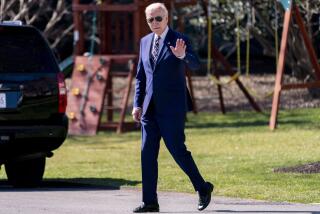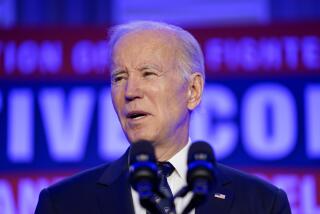Bush Sees Americans’ Having to Pay More for U.S. Programs
- Share via
ATLANTA — Vice President George Bush warned Friday that despite his pledge not to raise “taxes” if elected President, he would require Americans to pay the government more in other ways to finance federal programs.
As an example of the kind of non-tax revenue boosts that he could support, Bush said he approved of recently passed catastrophic health care legislation, which includes a 15% income tax surcharge on the 40% of elderly Americans who pay income taxes, and an increase of $75.60 per year in mandatory Medicare premiums. Together, the two measures are expected to bring in $31 billion more in federal revenue over the next five years.
“Philosophically,” there may not be any difference between that kind of revenue increase and a tax, Bush conceded at a press conference before a speech to a GOP rally here. But, he said, he will continue to make the distinction.
Cites Health Care Bill
The health care bill, he said, is not a “tax” increase, because “the beneficiaries pay” directly for a program that assists them. The emphasis on increasing non-tax fees could cover a wide variety of programs, Bush said. For example, he said, “I’m going to warn you, if you go to Yosemite Park with your trailer . . . you may have to pay a little more” to cover the cost of parks programs.
But, “I am saying no, never” to tax increases and “I think the voters know what I’m talking about,” he said.
Later, Bush repeated his tax pledge to the rally, where four of his former rivals for the GOP nomination praised him and outlined the themes that the Republicans hope to use against Massachusetts Gov. Michael S. Dukakis, the expected Democratic nominee, in the fall.
Beginning during the Republican primaries last winter, the “no new tax” pledge has become an ever-greater part of Bush’s campaign. He has repeatedly reminded audiences that Dukakis recently raised taxes in Massachusetts to close a budget gap.
A Dilemma for Bush
But the pledge creates a dilemma for him because, at the same time, Bush has pledged to reduce the federal deficit and continue the Reagan Administration’s multi-trillion-dollar defense buildup.
Dukakis also has said he hopes to reduce the deficit without new taxes. But Dukakis has called for slowing the defense buildup and has said he would not rule out tax increases as a “last resort.”
Dukakis has charged that Bush’s pledge of “never” on taxes is “irresponsible,” and he has charged that President Reagan, who also pledged not to accept tax increases, in fact has signed four tax increases amounting to $500 billion.
Bush said Friday that he “could do better” than Reagan “on controlling the growth of spending and therein lies the answer.” But he did not say how he could accomplish a goal that has so far eluded Reagan even at the height of his popularity.
By-Now-Familiar Attacks
Both in his press conference and his speech, Bush repeated several of his by-now-familiar attacks on Dukakis’ record: Massachusetts’ prison furlough program, Dukakis’ veto of a bill to mandate saying the Pledge of Allegiance in schools, his opposition to the death penalty and the fact that he is “a card-carrying member of the ACLU,” the American Civil Liberties Union.
He also opened up a new area of disagreement by criticizing Dukakis’ recent statements that he would emphasize strengthening NATO’s conventional, non-nuclear, forces rather than adding more weapons to U.S. nuclear stockpiles.
Building up conventional forces is a good idea, Bush said. But doing so while de-emphasizing nuclear weapons could weaken NATO’s ability to deter a Soviet attack.
Defends Campaign
In addition, Bush defended his campaign against charges that he was using taxpayer funds to finance his campaign efforts. Democratic National Committee Chairman Paul G. Kirk Jr. made the charges on Friday, citing the advance work and communications gear that White House aides provide to Bush as he campaigns.
Bush said his campaign reimburses the government for the cost of Air Force Two and other travel expenses but does accept logistical help provided to allow him to perform his official duties.
“We are not abusing the public trust,” he said.
More to Read
Get the L.A. Times Politics newsletter
Deeply reported insights into legislation, politics and policy from Sacramento, Washington and beyond. In your inbox twice per week.
You may occasionally receive promotional content from the Los Angeles Times.









